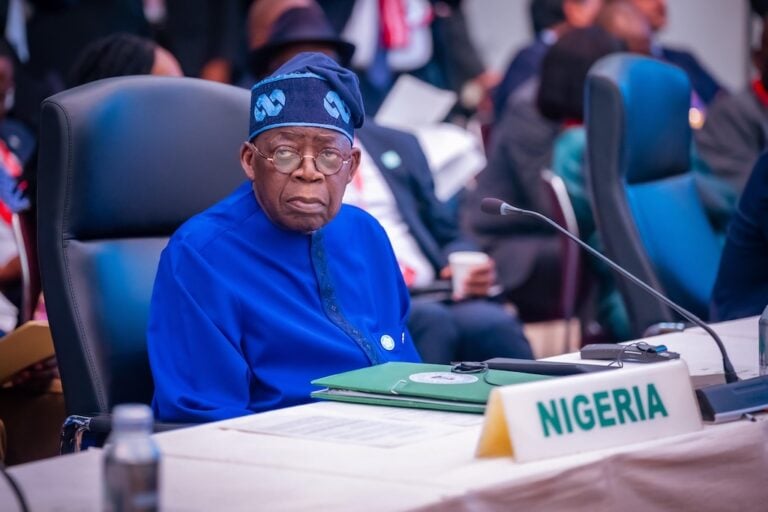Rome, Italy — Oct. 13, 2025: President Bola Ahmed Tinubu landed in Rome on Sunday evening to attend a heads-of-state meeting of the Aqaba Process, an international counter-terrorism forum co-chaired by Jordan and Italy and dedicated this year to the escalating security crisis in West Africa. The presidential jet touched down at Fiumicino at 7:20 p.m. local time, according to Voice of Nigeria’s pool report.

State House confirmed Tinubu is joining leaders, senior intelligence and defence officials for plenary sessions and bilateral meetings “to exchange assessments of the security landscape… and develop strategies to counter the terror threat on land and at sea.” The Presidency also flagged a focus on online radicalisation and terrorist digital networks.
Channels Television earlier reported the visit as part of the Aqaba Process’ heads-of-state track—launched in 2015 by King Abdullah II—with Rome serving as this year’s host alongside Jordan.
“In addition to attending the plenary sessions… President Tinubu will hold bilateral talks with other leaders to explore ways of addressing the rising security challenges across the sub-region,” presidential spokesperson Bayo Onanuga said.
Why Rome, Why Now
Aqaba Process pedigree: Created in 2015 by King Abdullah II as an informal, high-level forum to tighten operational coordination against terrorism across regions. Italy confirmed earlier this year that Rome would host a West Africa–focused round.
West Africa’s worsening metrics: The Sahel is now the global epicentre of terrorism, responsible for over half of worldwide terror deaths in 2024, with spillovers into coastal states and the Gulf of Guinea.
Nigeria’s exposure: Nigeria ranked 6th on the 2025 Global Terrorism Index and accounted for around 6% of global terrorism deaths in 2023, underscoring the stakes for Abuja.
The Agenda in Rome
Briefings from Abuja say discussions will tackle:
Cross-border networks linking Sahel insurgencies with Gulf of Guinea piracy;
The crime–terror nexus (arms, drugs, gold, human trafficking);
Digital radicalisation and disruption of online propaganda;
Joint maritime and land strategies, intelligence-sharing, and operational coordination.
Tinubu is accompanied by Minister of State for Foreign Affairs Bianca Odumegwu-Ojukwu, Defence Minister Mohammed Badaru, NSA Nuhu Ribadu, and NIA DG Mohammed Mohammed—a signal that Abuja intends to translate talks into working security channels.
A Region Under Pressure
Security vacuum & politics: The security picture has been complicated by coups and a shifting regional order—Burkina Faso, Mali, and Niger formally quit ECOWAS earlier this year, weakening multilateral levers as violence spread southward.
Hard numbers: The 2024/2025 GTI cycle shows rising lethality in attacks and expanding geographic reach; Nigeria’s own Terrorism Index reading edged higher in 2024.
Rule-of-law front: Abuja has pursued mixed counter-terrorism tools—from kinetic operations to mass prosecutions. In 2024, 125 Boko Haram members and financiers were convicted in federal mass trials.

Expectations.
* Actionable intel pacts: Expect movement on real-time intelligence fusion with Rome, Amman and coastal West African states. Italy has leaned into counter-terrorism and Mediterranean security this year; Rome’s convening power matters.
* Maritime security commitments: Joint patrol concepts and financing for Gulf of Guinea domain awareness will be a credibility test for the summit’s “land-sea” framing.
* Digital disruption: Concrete mechanisms to dismantle recruitment and financing online—from platform cooperation to takedown pipelines—will show the summit is more than communiqués.
* Bilateral deliverables: Track Tinubu’s side-meetings for equipment, training and judicial-cooperation deals; Abuja wants partners for border security and counter-IED, plus help tightening terrorism-financing enforcement.
Expert Take
Tinubu’s Rome trip is tactically about plugging Nigeria deeper into Aqaba’s operational web and politically about showing Abuja can still marshal coalitions despite a fragmented Sahel. The bar for impact is high: insurgent groups from IS-Sahel affiliates to local bandit networks have adapted faster than regional institutions. Without sustained maritime-land integration, improved human intelligence and civilian-harm mitigation, headline summits won’t bend the curve.
The Bottom Line
Nigeria is arriving in Rome with the right cast of security principals and a realistic agenda. The measure of success will be near-term, verifiable cooperation—shared watchlists, joint tasking, maritime patrol support—and a credible plan to choke digital radicalisation pipelines. Anything less risks being another well-worded gathering while the map keeps bleeding.
Reporting by Headlinenews.news. Sources: State House Nigeria, Channels TV, Voice of Nigeria, Italian MFA, Global Terrorism Index/IEP, GCERF, Security Council Report, Reuters/AP.




